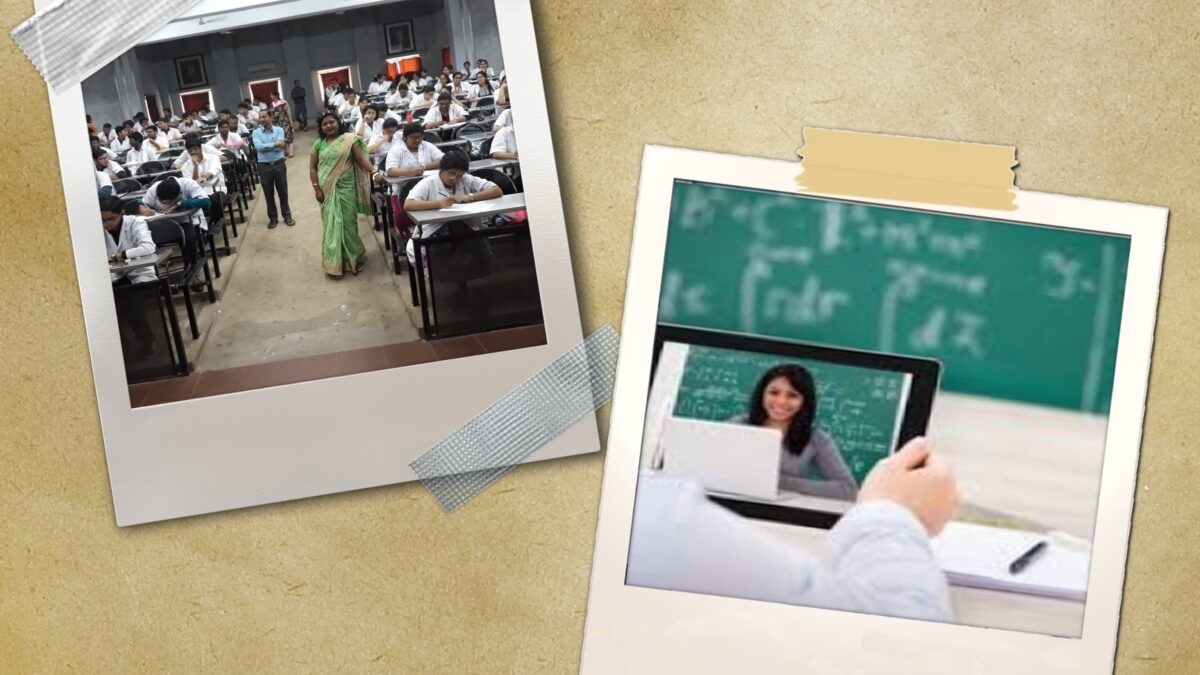- Have any Query?
- acharyaviyatprajna@gmail.com
Digital Vs Real classroom

Deluded Medicos
April 10, 2022
FOOD ASSOCIATION WITH FESTIVALS OF INDIA
April 10, 2022Casually I have been discussing with my colleague just a few days prior to the COVID restrictions….now that we have exhausted all teaching tools and students are catching up fast, they themselves presenting seminars with power point presentations like pro…. WHAT NEXT?? Didn’t know that I was prophesying a new era in teaching.
In the wake of COVID pandemic, teaching-learning in all sectors has taken a gigantic leap. Initially, resistance to change was felt. Some were very fast to pick up the new trend and led others from the front.
Few were pretty resistant…”phew…what is this digital teaching learning process?” “Eeow…how to talk to a ghost class!” Where is the charm of ridiculing a guy or a girl for their unmindfulness ..if nothing else, commenting on their dressing sense, playing games on mobiles or making a dosing student alert! Yes, lot of events have been missed during these virtual classes. There is no more uproar of laughter on cutting a joke, no commotion when the classes are stretched beyond time…yet it is all happening, there is no other go. This is the new normal….and till how long, no one knows. Naturally a question pops up in our minds, is this going to be the trend forever? Is digital classroom going to replace the real classroom?
Well, I was asking what’ll be new but nature gave us a big jolt and we all were catapulted to the current scenario and that too when we were so unprepared. And of course, with pride we would say apparently, we have been successful in digital classrooms too, overcoming initial hitches.
Basically, what digital classroom requires is:
- The teacher should be willing to learn and venture into an unknown or half-known world.
- He/ she must be techno-savvy.
- Willing to put extra effort to search for best possible and easy to use tools on internet or in their own systems
- Teachers should be creative enough not to bore the students with dry lectures but putting questions to students randomly and asking them to switch on the camera.
- Videos and animations that we used already in real classrooms should be in abundance.
- The teachers should be camera-friendly and keep the camera on for themselves so that the students remain connected.
Apart from these classroom hacks, we can upload assignments, have a flipped pattern classroom teaching once a while, ask some students to present seminars etc.
Initially to make my BDS students catch up with the MBBS students, I had to release a few PPT with narration and released them as YouTube videos and embedded them on my website.
Coming to evaluation, it was still a greater challenge. The written tests were nothing more than open-book exam systems. The google form subjective question answers were widely plagiarised. Students couldn’t imagine that teachers can be smarter than them to verify it. The only possible way that I could see was to have a direct viva by video calling with rapid fire questions, which will have least cheating possibilities.
But the bottom line is whether we can replace the classroom with digital mode of education…..it is a big NO, for the time being.
For the following reasons it may take another decade before really it is replaced so…
- Not all teachers can cope up (There are some teachers who have not grown out of pure chalk and talk teaching even.) Let’s rest the question of which method is better at the moment which may require a full session.
- The practice has to start from school, for the students to get acquainted with the online lectures and assignments etc. The malleability is definitely better at younger age.
- There should be a buffer time to have both modes and gradually we may migrate to digital mode.
- More tools and modalities will be required to accommodate a greater number of students on a single screen so as to maintain connectivity with the students and teachers.
- Evaluation methods have to change drastically. Introduction of AI (Artificial intelligence) may prepare a separate question paper for each candidate which may avert the cheating aspect.
- In Medical curriculum it is difficult to take exams without seeing patients though the concept of simulation labs has been introduced recently by CBME curriculum too. However, an interim arrangement can be done with virtual patient case studies. Albeit it won’t have the same effects that a practicing doctor should obtain as a trainee before entering into the field where he will be dealing with real human beings.
- We’ll lose on the front of inter-personal communication which is very vital for doctors. The psychological faculty of brain may take a new twist.
What makes Indian doctors so special across the globe is, their commitment, servitude, adjusting to the Nth extent while working in the pleomorphic country like India with second highest population and most importantly their human touch.
With the concept of digital classroom usurping, the rise for demand of doctors being met with increasing seats in Medical colleges (from 100 to 150 and now 250) a very disturbing question arises…are we going to lose the compassionate Indian doctors? Will machines be treating the patients?? Will human touch be giving way to artificial intelligence??? Are we going to be overpowered by technology like the Bhasmasura??




